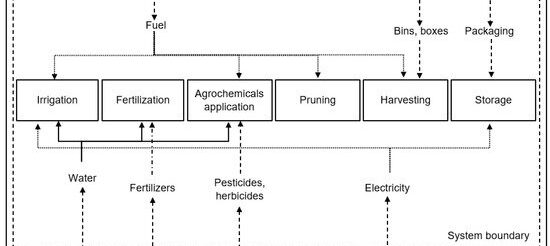Sustainability | Free Full-Text | Interpreting Environmental Impacts Resulting from Fruit Cultivation in a Business Innovation Perspective

Sustainability of food production is a major concern today. This study assessed the environmental impact of fruit production and discussed business implications for sustainability. Data were collected from three agricultural enterprises growing six species of fruit, extending over a total of 34 hectares, and producing roughly one thousand tons of fruit per year. The results of the life-cycle assessment (LCA) showed that several production activities heavily impact the environment: in descending order of absolute terms, fruit refrigeration, agronomic operations, irrigation, and fertilizer use were recognized as the most impacting. Other activities, including agrochemical applications, planting, and plastic use for harvesting and packaging, showed overall lower impacts. The high environmental impact associated with most of the production activities emphasizes the need to make the primary food production cleaner, more resource-efficient, and less energy-intensive. Affordable incremental innovations able to reshape the way business is conducted in the context of primary food production are proposed, mainly relying on process rationalization and digital switchover. The analysis of the business path toward increased sustainability involves strategic issues, ranging from the reshaping of production processes to relationships with consumers, affecting value proposition, creation, and capture.
View Full-Text
View Full-Text
Keywords:
business models; innovation; resource efficiency; sustainability; environmental assessment; fruit production; cleaner production; life cycle assessment (LCA); carbon footprint
business models; innovation; resource efficiency; sustainability; environmental assessment; fruit production; cleaner production; life cycle assessment (LCA); carbon footprint
Figure 1
This is an open access article distributed under the Creative Commons Attribution License which permits unrestricted use, distribution, and reproduction in any medium, provided the original work is properly cited
